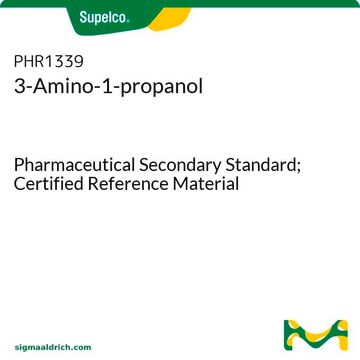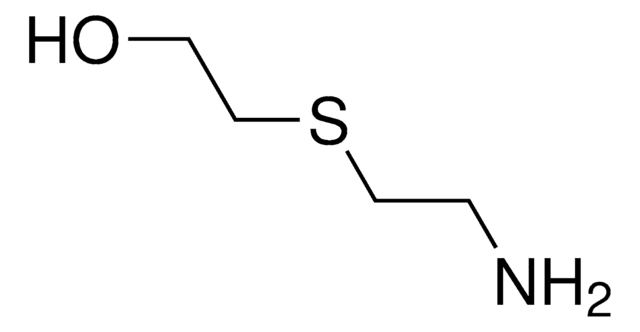01887
3-Amino-1-propanol
analytical standard
Synonym(s):
3-Aminopropyl alcohol
About This Item
Recommended Products
grade
analytical standard
Quality Level
vapor density
2.59 (vs air)
vapor pressure
2.1 mmHg ( 20 °C)
Assay
≥99.5% (GC)
autoignition temp.
770 °F
shelf life
limited shelf life, expiry date on the label
technique(s)
HPLC: suitable
gas chromatography (GC): suitable
refractive index
n20/D 1.4598 (lit.)
n20/D 1.461
bp
184-187 °C (lit.)
mp
10-12 °C (lit.)
density
0.982 g/mL at 20 °C (lit.)
application(s)
environmental
format
neat
SMILES string
NCCCO
InChI
1S/C3H9NO/c4-2-1-3-5/h5H,1-4H2
InChI key
WUGQZFFCHPXWKQ-UHFFFAOYSA-N
Looking for similar products? Visit Product Comparison Guide
General description
Recommended products
Signal Word
Danger
Hazard Statements
Precautionary Statements
Hazard Classifications
Acute Tox. 4 Oral - Eye Dam. 1 - Skin Corr. 1B
Storage Class Code
8A - Combustible corrosive hazardous materials
WGK
WGK 1
Flash Point(F)
212.0 °F - Pensky-Martens closed cup
Flash Point(C)
100 °C - Pensky-Martens closed cup
Personal Protective Equipment
Choose from one of the most recent versions:
Already Own This Product?
Find documentation for the products that you have recently purchased in the Document Library.
Our team of scientists has experience in all areas of research including Life Science, Material Science, Chemical Synthesis, Chromatography, Analytical and many others.
Contact Technical Service







